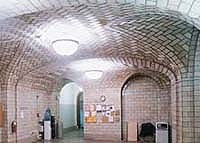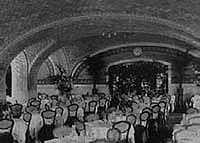 |
| "Your wooden arm you hold outstretched to shake with passers-by." |
A subset of the tour guides' fancies concern flowers. Eleanor Widener provided the funds to build the library as a memorial to her son, who went down on the Titanic, and in her will she did request that the Widener Room always contain some kind of fresh-cut flowers. But here's the tale as told by tour guides:
"Each and every morning a dozen red roses are delivered to the Widener Room."
"Flowers mysteriously appear every morning outside the Widener Room."
"Carnations were Harry's favorite flower."
"Harry used to have carnations dyed crimson to remind him of Harvard, and so his mother kept up the tradition."
"A special breed of crimson-colored carnations is delivered every week to the Widener Room."
"Every morning one carnation is delivered to the Widener Room."

Next we'll be told that the librarians serve oysters. The top-to-bottom renovation of Widener proceeds sequentially. The Widener Room is temporarily gutted, empty of books and flowers, but the tiles of Rafael Guastavino Jr.'s Catalan vaults on the ground floor have been cleaned and restored, and they gleam. "For all the talk about the revamping of Widener," says Thomas F. Glick '60, Ph.D. '68, professor of history at Boston University and of the history of science at Harvard Summer School, "the Guastavino ground floor, the architectural gem of the building, has not been mentioned in the magazinenot even once."
The Guastavino firm has enjoyed a bit of recent attention, viz. a 1996 Columbia University exhibit celebrating its work. Rafael Sr. was a Catalan builder and architect who came to New York in 1881. He and his son were hired as subcontractors by many leading architects and built their vaults and domes in more than 1,000 structures, among them Carnegie Hall, the Cathedral Church of St. John the Divine, and the Boston Public Library. "If you walk into Widener and look up," Glick notes, "you see something that looks just like the Oyster Bar at Grand Central in New York. It is astounding."
 |  |
| Widener Library | The Oyster Bar |
| Farrell Associates | Columbia University Record |

HILLBILLIES AT HARVARD
Among all these red bricks and white-painted
trim, there is bluegrass, with a red clay sound:
a high tenor wails his refrain over
precisely flat-picked guitar licks, banjo,
mandolin like the plucked teeth of a comb.
Down by the banks of Chuck Creek, the scholars
roll up their trousers, casting aside books
for a Saturday radio hoe-down.
Carey is a writer and clawhammer banjo player living in Cambridge, where she also has a private practice as a clinical psychologist.
~Primus V





